Advertisment
Does altered gait following ACL surgery contribute to additional knee problems?

For people with an injured anterior cruciate ligament (ACL) in the knee, surgical ACL reconstruction (ACLR) is an effective treatment for restoring joint stability, however, many treated patients still develop additional long-term knee problems, such as knee osteoarthritis. New research published in the Journal of Orthopaedic Research reveals that individuals exhibit an altered gait after ACLR, which can contribute to these problems.
For the study, investigators compared gait biomechanics between the ACLR and uninjured limbs of 58 patients who underwent ACLR and 58 uninjured control individuals.
Although gait biomechanics became more symmetrical in patients with ACLR over the first 12 months post‐ACLR, the ACLR and uninvolved limbs demonstrated persistent aberrant gait biomechanics compared with the uninjured control individuals.
“A persistent aberrant gait pattern following ACLR, like that observed in our study, can induce joint loads that may contribute to further long-term knee joint problems,” said corresponding author Christin Büttner, MS, of the University of North Carolina at Chapel Hill. Implementing early rehabilitative measures to normalize gait following ACLR could help to maintain long-term knee joint health in both the injured and uninjured limb.”
URL upon publication: https://onlinelibrary.wiley.com/doi/10.1002/jor.26001





